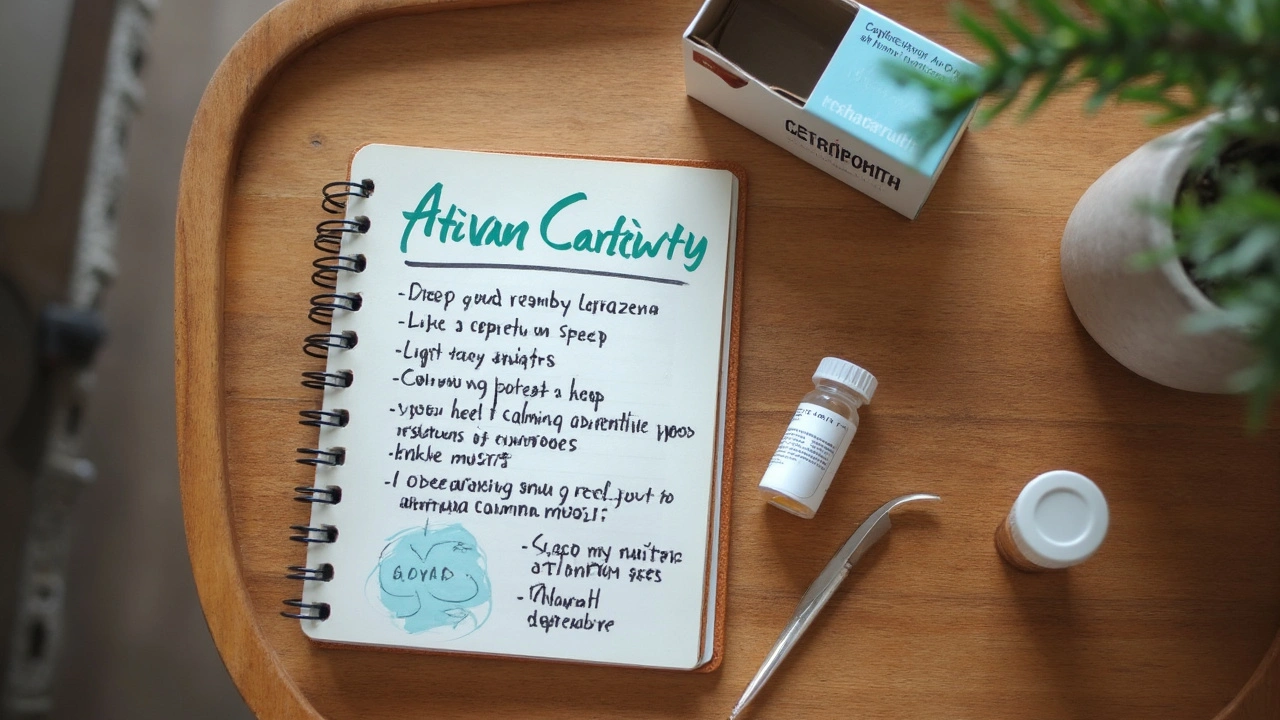Every Aussie knows someone coping with stress—that head-thumping, heart-racing crush that makes a normal Tuesday feel like a marathon. With life buzzing all the time, more people are looking for fast relief, reaching for meds like Ativan. But behind the clinic doors and pharmacy counters there’s a lot most people don’t get told about this little white pill. Medications like Ativan can bring hope, but grab them the wrong way and you’re in for a world of side effects you never signed up for. Here’s the truth about what’s in that pill, how it actually works, and what you need to weigh up before adding it to your routine.
What is Ativan and How Does It Work?
Ativan goes by the generic name lorazepam and sits quietly on pharmacy shelves as one of Australia’s most common prescription medications for anxiety. Developed in the 1970s, it’s part of a family of drugs called benzodiazepines. The basics? It calms your nervous system by boosting a brain chemical called GABA. You know those nights when you just can’t switch off your worries? GABA helps “switch off” some of that overactivity, like hitting a snooze button for your brain’s stress alarms.
Doctors will tell you Ativan is fast. Within 30 minutes, you could feel that wave of calm. But it’s more than just a chill pill. Hospitals use it for panic attacks, seizures, or before surgery to keep nerves in check. There’s also a fair bit of confusion about Ativan versus its cousins—Xanax (alprazolam), Valium (diazepam), and others. Ativan’s unique because it’s short-acting (washes out of your system faster) but packs a punch, so doctors often like it for sudden spikes in anxiety, or when something can't wait.
Here’s a simple data breakdown to compare Ativan with other popular benzos in Australia:
| Medication | Onset (min) | Peak Effect (hr) | Elimination Half-life (hr) |
|---|---|---|---|
| Ativan (Lorazepam) | 20-30 | 2 | 10-20 |
| Xanax (Alprazolam) | 15-30 | 1-2 | 12-15 |
| Valium (Diazepam) | 30-60 | 1-2 | 20-70 |
Ativan’s short-acting nature means there’s a lower risk of hangover drowsiness but it might need to be taken more often for long periods of stress. If you’re wondering about getting addicted, it’s in the same risk group as the rest—so regular, long-term use isn’t recommended unless there’s a solid plan with your GP.
Why Do People Get Prescribed Ativan?
This is where things get personal. I’ve seen mates prescribed Ativan for the kind of nerves that make you want to call in sick over a work meeting—or those nights when sleep just isn’t an option. Ativan’s biggest job is treating anxiety and panic attacks, but it shows up in the hospital for a bunch of other reasons. Some use it to prep for surgery when the thought of the hospital bed sends the heart racing. Neurologists might use it for stopping seizures (especially when there’s no time to waste), and it can even help with severe nausea from cancer treatment. In aged care homes, it’s sometimes on the list for calming aggression in dementia, though this use is more closely monitored these days because of the risks involved.
Here are the main things Ativan gets prescribed for in Australia:
- Anxiety disorders (chronic or sudden, like panic attacks)
- Short-term relief from severe stress (think: grief, shock, traumatic events)
- Trouble sleeping when it’s linked to anxiety (but not long-term)
- Calming patients before minor surgeries or medical scans
- Controlling seizures (in emergencies or as part of a bigger plan)
- As part of detox protocols for alcohol withdrawal in safe environments
The key word here is “short-term.” No doctor in Melbourne who’s keeping up with best practices will give you repeats for months on end. Ativan is meant to help when things are truly out of control—when your anxiety is so bad it stops you functioning, not just because life feels a bit busy.
Your doctor should always check how Ativan fits into your story. If depression, sleep problems, or another health concern is running the show, they may suggest something different. And if you’re ever prescribed Ativan without being told how long to use it, or how to come off it safely, don’t be scared to ask for more details.

Side Effects and Risks: What To Watch Out For
No one likes reading the fine print on a medicine box, but with Ativan, skipping those side effect warnings isn’t a smart move. Here’s the raw deal: the most common side effect is drowsiness. People often say it feels almost like jet lag; your body wants a nap even if your mind is finally calm. This is why the pharmacist will warn you against driving—no one wants to drift on the Monash Freeway.
But there are others worth knowing about:
- Dizziness and unsteady balance (which can be dangerous if you’re older or already a bit wobbly)
- Confusion, especially in folks over 65 (some describe it like walking through clouds)
- Forgetfulness or memory blanks (that “wait, what was I saying?” feeling)
- Headaches, dry mouth, and sometimes blurry vision
- Mood changes—rare, but some notice depression or irritability get worse
- Breathing troubles—especially if mixed with alcohol, painkillers, or sleep meds
The big concern with benzodiazepines like Ativan is dependence. Regular use builds up tolerance, so you need more to get the same effect. Before you know it, you can’t sleep or calm down without it. Worse, your body might rebel if you stop cold-turkey—cue shakiness, sweating, and a surge of anxious thoughts. That’s why any plan to come off Ativan needs to be gradual and supervised. I can’t count the stories I’ve heard of people toughing it out but ending up feeling worse than before. Your doctor or pharmacist should take your withdrawal questions as seriously as they take your prescription.
Here are some useful tips if you’re using (or considering) Ativan:
- Take it exactly as your doctor told you—don’t freestyle your dose.
- If you miss a dose, don’t double up. Just take your next one as planned.
- If you start feeling off-balance, drowsy, or notice anything weird, let your doctor know pronto.
- Never share your meds with anyone, even if they seem to have the same issues. What’s safe for you could be dangerous for them.
- Always check with your doctor before mixing Ativan with anything else—including herbal teas, cold meds, or supplements. Some combos are risky.
Safe Use and Smarter Alternatives
Here’s where things get interesting: loads of Aussies start Ativan thinking it’ll be a magic fix, only to wish months later they’d tried other things first. Yes, it’s powerful. Yes, when a panic attack hits and feels like you just downed three espressos, you want something fast. But safe use is all about clear limits and options. Ativan isn’t your daily stress pill or a fix for insomnia that pops up every Sunday night.
Think about these safer moves if your anxiety or sleep issues are more stubborn than a two-year-old who won’t nap:
- Tried-and-true talking therapies (cognitive behavioral therapy is the gold standard for anxiety and panic—yes, it really works!)
- Lifestyle stuff that actually makes a difference: regular exercise, dropping caffeine, sticking to a schedule for sleep
- Mindfulness or relaxation apps (I like Smiling Mind—created here in Australia, and not just for kids)
- Other medications with longer safety records for long-term use, like SSRIs (fluoxetine, sertraline) when anxiety is part of a bigger ongoing issue
The most important rule? Ativan is there for the worst of the worst—like a fire extinguisher, not a room freshener. Rescue, not routine. Anyone prescribing it should give you a plan, including what happens when it’s time to stop. If not, ask until you get straight answers. Be up front if you’ve got a history with alcohol or substance use—it makes a difference to what’s safest for you.
I’ve talked to dozens of people who appreciated a bit of Ativan when their life fell off the rails but regretted every step into daily use. It sneaks up on you. Suddenly, you notice you’re half-asleep through every work meeting and can’t remember your mate’s birthday dinner. Average Australians on regular lorazepam for six weeks or longer have a much higher chance of rebound anxiety, memory problems, and falls—especially if they’re past their 50s.

Real Stories, Real Struggles: Making the Best Decision
Sit down in any Melbourne café and I’d bet at least one table has a story about Ativan. Maybe it was the mum who needed it to get through a messy divorce or a mate who used it for public speaking nerves that just wouldn’t quit. But the happiest endings are always when the person used Ativan for a short burst—with clear steps for what was next. No one’s life gets better from endless drowsiness or fuzzy memories.
I know a friend who swears Ativan turned her life around during a chemo round—she finally slept a bit, ate something, and faced treatment less scared. When the worst passed, she and her GP made a plan to stop together. Flip side? I once met a bloke who took Ativan daily after a job loss. He felt “normal” for a few months, until he noticed he couldn’t go a day without it and started dodging events just to keep the haze at bay. Kicking it was hard—not just physically, but emotionally, too. Don’t underestimate that part.
If you’re supporting someone on Ativan, your honesty and patience matter. Notice if they draw back from work or mates, start slurring speech, or have new memory lapses. Encourage check-ins with their doctor, and remind them there’s no shame in needing help to stop or taper off. Mental health in 2025 is about teamwork—no one has to manage by themselves. If you see warning flags, step in gently. People do weird things when they’re feeling swamped by stress.
At the end of the day, Ativan can be a real game changer when you need a circuit-breaker for anxiety or panic. Just respect its power and remember that life’s problems—whether they’re barking dogs, late bills, or bad days—don’t always need a pill for the fix. Sometimes, it’s about who you’ve got around you, the questions you ask, and knowing the right moment to try something different.






Émilie Maurice
July 18, 2025 AT 13:35First off, I must say this guide does a decent job outlining Ativan’s uses and safety, but some parts seem glossed over. For instance, it’s super important to emphasize how addictive benzodiazepines like Ativan can be – that should never be downplayed or sugarcoated.
Also, the article's grammar could use a bit more polish in some sections; I know it says plain English, but clarity is crucial especially when discussing medications. I appreciate the attempt to make things accessible but sometimes oversimplification risks losing vital details.
Moreover, I hope readers understand that Ativan isn’t a magic fix for anxiety or sleep without accompanying lifestyle changes or therapy. Relying solely on pills can lead to serious dependency issues down the road.
Lastly, the article could improve by including clear warnings about withdrawal symptoms and guidance on tapering off the drug safely. That is absolutely essential information.
All in all, a decent starting point but definitely room for critical improvements for safety and depth.
Ellie Haynal
July 18, 2025 AT 14:35Oh, come on! It’s just another pharma push to get everyone hooked on sedatives, honestly. I mean, they call it a “popular prescription” like it’s candy or some trendy thing. It’s so disturbing how casually these drugs are prescribed without even considering long-term consequences.
I'm sick of people ignoring the real damage benzodiazepines cause. It’s not just a little side effect; it’s a full-on life wrecking machine for many.
And yes, please don’t tell me it’s ‘safe’ just because it’s prescribed. Safe my eye! Lots of addicts started just like that, thinking it’s fine.
We need more awareness and less glorifying these substances. Honestly, if you’re supporting someone taking Ativan, be vigilant. It’s not just peaceful sleep; it can lead to nightmares of dependency.
Sorry for the drama but this topic triggers me hard.
Jimmy Gammell
July 19, 2025 AT 13:55Hey folks, I totally get the concerns here, especially about dependency and side effects. :/ But let’s not demonize Ativan entirely. It’s helped a lot of people struggling with severe anxiety and sleep problems when used responsibly.
I'm reminding everyone that working closely with your healthcare provider is key here. They can guide safe dosage and duration to minimize risks.
What helped a friend of mine was clear communication and gradual tapering off rather than abrupt stops that can be dangerous.
Also, combining meds with therapy or lifestyle adjustments tends to yield the best outcomes physically and mentally. :)
So let’s keep supportive vibes – knowledge and caution together can really improve lives.
fred warner
July 21, 2025 AT 15:40Absolutely agree with you! Responsible use is the backbone of any medication's success, especially something potent like lorazepam. It's not meant to be a long-term fix but rather a stepping stone toward better mental health.
The article does mention practical tips and safety, which I find encouraging as it promotes informed choices. Ignorance is far more dangerous when it comes to prescriptions.
For those worried about addiction, consult your doctor if you notice anything unusual. Early intervention can prevent serious problems.
It’s also great they highlighted clinical experience and current facts rather than just hearsay. Let’s stay optimistic but cautious, folks!
Veronica Mayfair
July 28, 2025 AT 03:10❤️ Totally feeling the mix here! I take Ativan myself during super stressful times and yeah, it’s like a lifesaver but you gotta be soooo careful. I always keep it strictly for emergency anxiety attacks, never daily!
One emoji for caution: ⚠️ – it can mess with you if you don’t listen to your body or docs. Remember, don’t mix with alcohol and try to avoid operating heavy machinery.
The article’s friendly tone really helps me understand it better though, definitely less intimidating than medical jargon.
Also shoutout to everyone sharing their insights because it helps us all learn from experience 😊
Rahul Kr
July 31, 2025 AT 23:20:) I find this guide nicely laid out for newcomers who might be overwhelmed by pharmacological terms. Mental health meds often scare ppl off, so understandable simplicity is a good thing.
True, some parts could be elaborated more, but coverage of side effects and safety tips was pretty solid from what I read.
Just want to encourage anyone using Ativan to keep track of how you feel physically and mentally and communicate changes with your doc regularly.
Remember, this is a tool but not a cure, so don’t rely on it alone.
Anthony Coppedge
August 3, 2025 AT 09:20Okay, grammar buddy here and I gotta say, the article is mostly clear but some sentences could be streamlined. Overusing passive voice makes parts a bit clunky. Also, occasionally there are commas where they don’t seem needed, which breaks flow.
But that minor nitpick aside, the factual accuracy and practical advice scored high points for me. Anyone thinking about starting Ativan or supporting someone should definitely keep this to refer back to.
As always, I stress the importance of sticking to instructions and monitoring side effects diligently; overdosing or prolonged use without supervision is a recipe for serious trouble.
Feel free to ask if you need help clarifying any medical terminology from the article as well.
Joshua Logronio
August 6, 2025 AT 03:20Guys, wake up... The whole pharma industry wants us chained to meds like Ativan. There’s this big push to normalize it because they profit massively. Have you noticed how the article frames it as ‘popular’ and ‘safe’? That’s a classic technique to lower your skepticism.
I’d seriously look into natural alternatives or holistic approaches. The brain isn’t just a machine that can be switched off with a pill, right?
Also, side effects might seem mild but are often underreported. Watch out for the signs they don’t tell you upfront.
The ‘clinical experience’ mentioned could be biased by the pharma funding. Just saying.
Dave Barnes
August 10, 2025 AT 13:20Interesting points being made here. I think the real question is how do we balance the undeniable therapeutic benefits of Ativan with its risks. From my perspective, it’s about mindful, intentional use rather than blanket rejection or unchecked acceptance.
Philosophically, medication should ideally be a companion to holistic healing, not a substitute. The article hints at that but perhaps could emphasize it more.
We should question but also appreciate advances in psychopharmacology, provided it’s handled ethically and transparently.
The shared personal experiences help fully grasp the complexity of using such medication.
Prateek Kohli
August 13, 2025 AT 07:00Hey everyone, just chiming in with a calm perspective :) From what I’ve seen in clinical settings, Ativan indeed has valid uses and can provide big relief. The key is proper assessment beforehand plus ongoing monitoring throughout treatment.
What I like about this guide is its straightforward language making it less overwhelming for patients who are scared by dense medical texts.
Of course, I always encourage complementing medication with psychotherapy and lifestyle improvements for best results.
Dependency concerns are well-founded but manageable with professional help.
Noah Cokelaere
August 16, 2025 AT 14:00Isn’t it funny how so many view Ativan as either a blessing or a curse? Like, can’t it just be what it is? A medication that, yeah, can mess you up if abused but also offers legit help? LOL.
Sometimes people get caught in too much fear or hype about meds and lose sight of reality. It’s not a magic pill or a devil drug—just a tool.
That said, sneaking suspicion that we’re all pawns in Big Pharma’s grand chess game might be too on the nose, huh? 🤔
Anyway, good read overall for those looking for factual info without all the scare tactics.